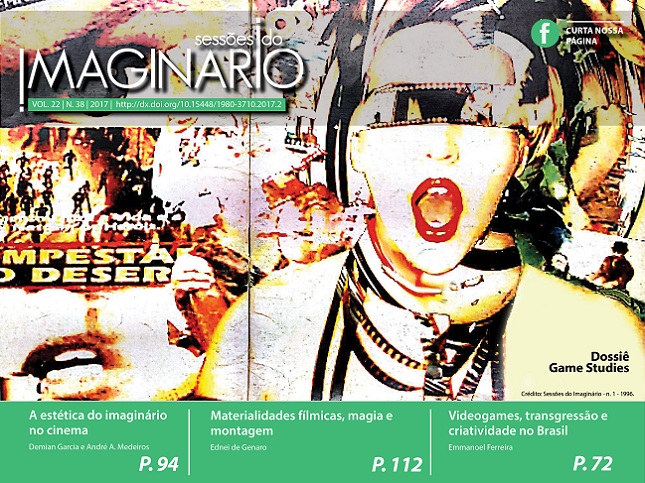Uma experiência de limiar: sobre a medialidade dos jogos (de computador)
DOI:
https://doi.org/10.15448/1980-3710.2017.2.32140Keywords:
teorias dos jogos, teorias da comunicação, teorias dos media, filosofia dos mediaAbstract
O presente texto realiza um breve estudo conceitual sobre o jogo e o lúdico. A partir da exposição das estruturais mediais e ontológicas do jogo, este trabalho argumenta sobre a sua particularidade como uma experiência de limiar. Por fim, por meio de uma caracterização das especificidades dos jogos de computador, levanta-se a discussão sobre um conflito conceitual entre jogo e comunicação.
References
BATESON, Gregory. “A Theory of Game and Fantasy.” In: BATESON, Gregory. Steps to an Ecology of Mind, p. 183–99. Northvale-NJ/London: Jason Aronson, 1972.
BEIL, Benjamin. Game Studies: Eine Einführung. Berlin: Lit, 2013.
CAILLOIS, Roger. Man, Play, and Games. Trad. Meyer Barash. Chicago: University of Illinois Press, 2011.
DISTELMAYER, Jan; HANKE, Christine; MERSCH, Dieter Mersch (Org.). Game over!? Perspektiven Des Computerspiels. Bielefeld: transcript, 2008.
FUCHS, Mathias; FIZEK, Sonia; RUFFINO, Paolo; SCHRAPE, Niklas (Org.). Rethinking Gamification. Lüneburg: Meson Press by Hybrid, 2014.
GADAMER, Hans-Georg. Wahrheit und Methode: Grundzuge Der Philosophischen Hermeneutik. Tübingen: Mohr Siebeck, 1975.
GOODMAN, Nelson. Languages of Art: An Approach to a Theory of Symbols. Indianapolis/New York/Kansas City: Hackett Publishing, 1968.
GÜNZEL, Stephan. “The Mediality of Computer Games”. In: FROMME, Johannes; UNGER, Alexander (Org.), Computer Games and New Media Cultures, p. 31–46. Dordrecht: Springer Netherlands, 2012.
HOAD, T. F. “Illusion”. The Concise Oxford Dictionary of English Etymology. Oxford University Press, 1996.
HUIZINGA, Johan. Homo Ludens: A Study of the Play-Element in Culture. London: Routledge & Kegan Paul, 1980.
JUUL, Jesper. The Art of Failure: An Essay on the Pain of Playing Video Games. Cambridge: The MIT Press, 2013.
KAPP, Karl M. The Gamification of Learning and Instruction: Game-Based Methods and Strategies for Training and Education. Hoboken: John Wiley & Sons, 2012.
LIEBE, Michael. “There Is No Magic Circle: On the Difference between Computer Games and Traditional Games”. In: GÜNZEL, Stephan; LIEBE, Michael; MERSCH, Dieter (Org.). Philosophy of Computer Games, p. 324–41. Potsdam: Potsdam University Press, 2008.
MAHRENHOLZ, Simone. “Analogisches Denken. Aspekte Nicht-Diskursiver Rationalität.” In: MERSCH, Dieter (Org.). Die Medien der Künste: Beiträge zur Theorie des Darstellens, p. 75–92. Munique/Paderborn: Wilhelm Fink, 2003.
MERSCH, Dieter. “Logik und Medialität des Computerspiels. Eine Medientheoretische Analyse”. In: DISTELMAYER, Jan; HANKE, Christine; MERSCH, Dieter Mersch (Org.). Game over!? Perspektiven Des Computerspiels, p. 9–41. Bielefeld: transcript, 2008.
———. Ordo Ab Chao - Order from Noise. Berlin/Zürich: Diaphanes, 2014
NEITZEL, Britta. “Metacommunicative Circles.” In: GÜNZEL, Stephan; LIEBE, Michael; MERSCH, Dieter (Org.). Philosophy of Computer Games, p. 278–95. Potsdam: Potsdam University Press, 2008.
PIAS, Claus. Computer Spiel Welten. Munique: sequenzia, 2002.
RAUTZENBERG, Markus. “Gerahmte Ungewissheit. Medialiät dnd Kontingenz im digitalen Zeitalter”. WULF, Wulf; ZABOTKINA, Vera (Org). Paragrana 24 (2), 57–73. Berlin: De Gruyter, 2015.
VON NEUMANN, John; MORGENSTERN, Oskar. Theory of Games and Economic Behavior. Princeton: Princeton University Press, 1944.
WOLF, Mark. The Medium of the Video Game. Austin: University of Texas Press, 2010.
Downloads
Published
Issue
Section
License
Copyright (c) 2018 Sessões do Imaginário

This work is licensed under a Creative Commons Attribution-NonCommercial 4.0 International License.
COPYRIGHT
The submission of originals to Imaginario implies the transfer by the authors of the right for publication. Authors retain copyright and grant the journal right of first publication. If the authors wish to include the same data into another publication, they must cite Imaginario as the site of original publication.
CREATIVE COMMONS LICENSE
As this journal is open access, the articles are allowed free use in scientific and educational applications, with citation of the source.
According to the type of Creative Commons License (CC-BY 4.0) adopted by Imaginario, the user must respect the requirements below.
You are free to:
Share — copy and redistribute the material in any medium or format.
Adapt — remix, transform, and build upon the material for any purpose, even commercially.
However, only under the following terms:
Attribution — You must give appropriate credit, provide a link to the license, and indicate if changes were made. You may do so in any reasonable manner, but not in any way that suggests Imaginario endorses you or your use.
No additional restrictions — You may not apply legal terms or technological measures that legally restrict others from doing anything the license permits.
Notices:
You do not have to comply with the license for elements of the material in the public domain or where your use is permitted by an applicable exception or limitation.
No warranties are given. The license may not give you all of the permissions necessary for your intended use. For example, other rights such as publicity, privacy, or moral rights may limit how you use the material.
For more details on the Creative Commons license, please follow the link in the footer of this website.

